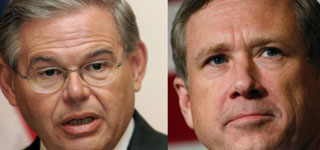 The US senate is in the process of reintroducing sanctions on Iran in their legislation, ones that would keep them always under a close inquiry. A specialized committee is expected to vote in the next few weeks on a bill authored by Democratic Senator Robert Menendez and Republican Senator Mark Kirk that would increase sanctions on the current Iranian regime, if the nuclear negotiations fail with them.
The US senate is in the process of reintroducing sanctions on Iran in their legislation, ones that would keep them always under a close inquiry. A specialized committee is expected to vote in the next few weeks on a bill authored by Democratic Senator Robert Menendez and Republican Senator Mark Kirk that would increase sanctions on the current Iranian regime, if the nuclear negotiations fail with them.
Republican lawmakers said on Thursday, that they plan to reintroduce legislation with a stand on Iran’s nuclear program, one that would be much stricter than before. Both democrats and republicans, agree on such sanctions, given the resistance by the Iranian regime to negotiate on their nuclear assets. The US Department of State, clearly states that in response to Iran’s continued illicit nuclear activities, the United States and other countries have imposed unprecedented sanctions to censure Iran and prevent its further progress in prohibited nuclear activities, as well as to persuade Tehran to address the international community’s concerns about its nuclear program.
This is not the first time the US has imposed sanctions on Iran , where the Menendez-Kirk sanctions bill was introduced in December 2013 for the same purpose, but did not come up for vote in the Senate when it was controlled by President Barack Obama’s fellow Democrats. The White House insisted its passage could endanger international negotiations on Iran’s nuclear program.
The United States, France, Germany, Britain, Russia and China reached a preliminary agreement with Iran in 2013 for it to suspend its sensitive nuclear activity in return for easing some economic sanctions. However, all sides failed to meet a self-imposed deadline for a second time in December and extended the preliminary accord by seven months. This callous attitude amongst countries angered the US lawmakers where they demanded President Obama to be more coercive with the Iranian regime.
The US state department has selected the Acting Deputy Secretary Wendy Sherman for these dialogues, who has led the U.S. delegation for more than two years, where he is heading a team of senior officials and advisers to the next round of bilateral negotiations from January 15 to 17.
Looking at the other side of the same coin, the Iranian regime’s supreme leader Ali Khamenei, on Wednesday voiced his distrust for the U.S where he weighed the prospects of this complex nuclear deal. He once again reminded people that the current regime’s survival hangs on this nuclear program, one if compromised would ultimately topple the country. He was not against negotiations, however calling the Western countries Iran’s enemies, he claimed their solutions and deals as only being illusionary, having no benefit for them.







